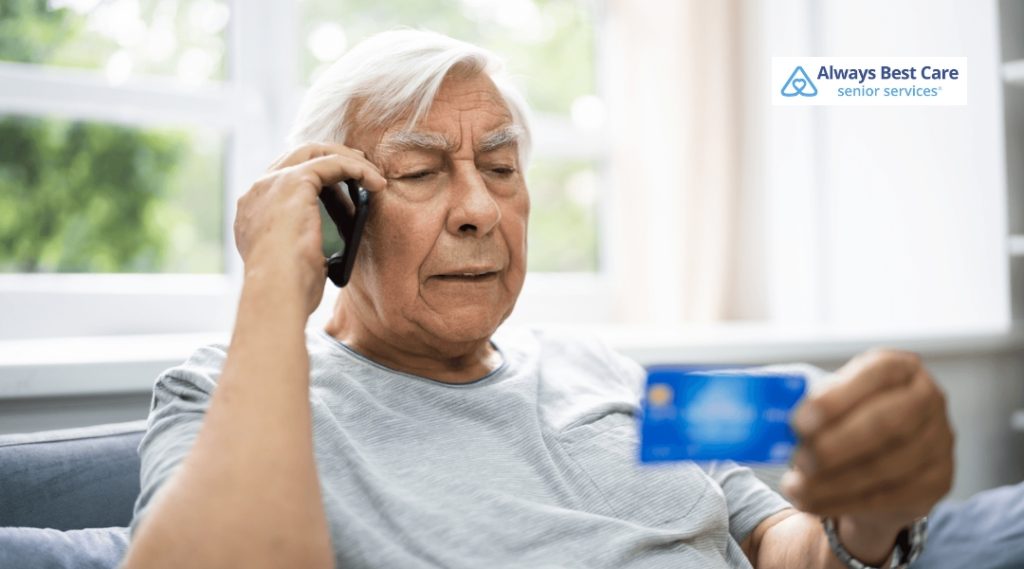Stay Safe: How Seniors Can Spot and Avoid Scams in Baton Rouge, LA

Scams are becoming more common—and unfortunately, seniors are often targeted. Whether it’s a suspicious phone call, a misleading email, or someone showing up at the door with too-good-to-be-true promises, it can be hard to know what’s real and what’s a trick.
At Always Best Care, we understand how overwhelming this can feel. That’s why our dedicated caregivers are here to offer not just companionship but also guidance and support to help seniors in Baton Rouge stay informed and protected. Together, we can keep our community safer—one smart choice at a time.
Table of Contents
Why Seniors are Targeted
Scammers often see seniors as easy targets—and unfortunately, they’re not wrong. Many older adults grew up in a time when people were more trusting and polite, making it harder to hang up on a caller or question someone’s intentions. Seniors are also more likely to be at home during the day, have landline phones, and may not be as familiar with the latest technology or scam tactics.
Some scammers assume seniors have access to retirement savings or a steady income from Social Security, making them a more appealing target. Cognitive decline, loneliness, and a desire for connection can also make older adults more vulnerable to manipulation.

5 Scams to Watch Out for in Baton Rouge
Phone Scams: “Grandparent” and IRS Impersonation
These scams often start with a phone call. In the “grandparent scam,” someone pretends to be a grandchild in trouble, begging for money to get out of a crisis—like a car accident or jail. They may even use the grandchild’s real name, found through social media.
Another common trick is the IRS scam, where a caller pretends to be from the IRS, threatening arrest or fines unless immediate payment is made. The IRS will never demand payment over the phone or threaten you with jail time.
If a call feels suspicious, hang up.
Medicare and Health Insurance Fraud
Scammers often target seniors by pretending to be Medicare representatives or health providers. They may offer free medical equipment or services but ask for your Medicare number or other personal information.
Once they have it, they can bill Medicare for services you never received—or steal your identity. Always check with your doctor before accepting any medical services or supplies.
Online and Email Phishing Attacks
Phishing scams use fake emails or websites to trick you into giving up sensitive information. You might receive an email that looks like it’s from your bank, Social Security, or even a friend, asking you to click a link or share passwords.
These scams can be especially confusing if you’re not used to navigating the internet.

Home Repair and Contractor Scams
After a storm or during home maintenance season, scammers may go door-to-door offering repairs at a “discounted rate.” They may ask for payment upfront and then never return—or do shoddy, unfinished work.
Only hire licensed and well-reviewed contractors, and never feel pressured to make a quick decision.
Romance Scams: A Growing Concern
Online dating and social media can be wonderful ways to connect, but unfortunately, scammers often use these platforms to build fake relationships. They may spend weeks gaining your trust, only to eventually ask for money—usually for an emergency or a plane ticket to “come visit.”
These scams are emotionally painful and financially devastating. If someone you’ve never met in person is asking for money, it’s a red flag.
3 Red Flags: How to Spot a Scam Before It’s Too Late
Urgency and Pressure to Act Fast
One of the biggest red flags is the pressure to act immediately. Scammers will often say things like, “You only have a few minutes to respond!” or “If you don’t send the money now, something bad will happen.” They count on fear and panic to push you into quick decisions.
Take a breath. A legitimate company or agency will always give you time to think things over or verify its identity.

Requests for Personal Information or Money
Another sign of a scam is being asked to share personal or financial information, like your Social Security number, bank details, Medicare number, or even passwords. Scammers might pretend to be from your bank or a government agency, but real representatives won’t ask for that information over the phone or by email.
If someone you don’t know is asking for money—especially if you didn’t initiate contact—that’s a red flag. Always double-check before sharing any private details.
Unusual Payment Methods
If someone asks you to pay using gift cards, wire transfers, or cryptocurrency, it’s almost always a scam. No legitimate business or government agency will ask for payment that way. Scammers love gift cards because they’re hard to trace and easy to steal.
If you’re ever asked to “go buy gift cards and read the numbers over the phone,” stop and reach out to a caregiver or family member immediately.
How to Protect Yourself or a Loved One
Protecting yourself or a loved one from scams starts with open communication and a few smart habits.
Set clear boundaries about who is allowed to call, visit, or request personal information.
It’s important to develop safe practices, like letting unknown calls go to voicemail or verifying identities before responding to requests.
Having regular conversations with a trusted family member or caregiver can help spot unusual activity early on.
Keeping a close eye on finances is also essential. Review bank statements, Medicare bills, and credit card activity for anything out of the ordinary.
Being cautious online is just as important—avoid clicking on suspicious links or downloading unknown files.

Helpful Resources for Seniors in Baton Rouge
Baton Rouge has several resources designed to help protect seniors from scams. The Baton Rouge Police Department and the East Baton Rouge Sheriff’s Office both offer fraud prevention tips and welcome reports of suspicious activity.
What to Do If You’ve Been Scammed
If you or a loved one has fallen for a scam, don’t feel embarrassed—scammers are professionals, and it can happen to anyone.
The most important thing is to act quickly. Report the scam to local law enforcement and any relevant agencies, such as your bank, credit card company, or Medicare. You should also file a report with the Federal Trade Commission.
Remember, there’s no shame in being targeted. What matters most is speaking up and getting the support you need to move forward safely.
How In-Home Care in Baton Rouge Can Provide Added Protection
An in-home caregiver can provide valuable assistance in identifying and preventing scams.
Caregivers can help seniors manage mail, screen phone calls, and recognize suspicious messages. They also provide companionship and emotional support, making seniors less likely to engage with scammers out of loneliness or confusion.
At Always Best Care of Baton Rouge, we are dedicated to ensuring the safety and well-being of seniors. Our compassionate caregivers provide daily assistance, companionship, and guidance to help protect against fraud.
Contact Always Best Care of Baton Rouge at (225) 771-8605 to learn more and schedule your free consultation. Stay informed, stay alert, and stay safe.





